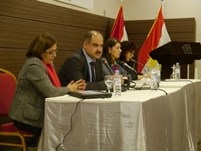 The Minister of Health of the Kurdistan region thanked health partners for their continued support and efforts in the health response. Erbil, Iraq - On 3 December, WHO participated in a round table discussion to address health services availability and equity of access for displaced women residing in the Kurdistan region of Iraq. Facilitated by the Ministry of Health of the Kurdistan Regional Government and the Kurdistan High Council of Women, the meeting hosted representatives from Kurdistan Directorates of Health, UN agencies and a number of nongovernmental organizations operating in Kurdistan region.
The Minister of Health of the Kurdistan region thanked health partners for their continued support and efforts in the health response. Erbil, Iraq - On 3 December, WHO participated in a round table discussion to address health services availability and equity of access for displaced women residing in the Kurdistan region of Iraq. Facilitated by the Ministry of Health of the Kurdistan Regional Government and the Kurdistan High Council of Women, the meeting hosted representatives from Kurdistan Directorates of Health, UN agencies and a number of nongovernmental organizations operating in Kurdistan region.
WHO’s Dr Ahmed Zouiten spoke on the need for careful design of humanitarian health programmes to address the particular health needs of displaced women and girls living in camps and in host communities, and the pitfalls of implementing blanket policies and programmes for all, in the health response.
“Humanitarian health action must be evidence-based and needs driven,” said Dr Zouiten.
“We need to be very careful about the way we address the different needs of the affected populations. This is not a one-size-fits-all approach – women and girls have very different health needs to men and boys and we need to address these appropriately. As a matter of accountability, we need to ensure that our humanitarian health response takes into consideration cultural aspects and sensitivities,” he said.
The Ministry of Health of the Kurdistan region, with the support of WHO and health cluster partner agencies, provides a comprehensive package of primary health care services including maternal and reproductive health care, for displaced people in camps and host communities. The United Nations Population Fund (UNFPA) and other health cluster agencies assist in the provision of family planning services and hygiene kits, and raise health and hygiene awareness through community education initiatives. Gaps in services exist however, with barriers to health access inhibiting the effectiveness of programmes.
“More attention needs to be given to ensuring equity in access to health care services for women and girls, with special attention to their particular health care needs,” said Dr Zouiten.
“Cultural sensitivities come into play here – having a male doctor providing reproductive health care services to women, for example, may result in these women not seeking the care they need,” he said.
Issues such as balancing the distribution of services in camps and urban communities, rehabilitation of primary health care centers and the supply of health care equipment for services for women and girls were discussed during the meeting. The need for continued cooperation between the UN, NGOs and the Ministry and Directorates of Health was also a highlighted topic of conversation.
“Iraq is facing one of the largest displacement crises in the world, at this time,” Dr Zouiten said.
“We require all health partners to work together to tackle these issues, so that we can provide targeted support to the most vulnerable,” he added.
Approximately 2.1 million people have been displaced from other parts of Iraq, with about one million IDPs now living in the Kudistan region. Close to 230 000 Syrian refugees reside in camps in the same region.
WHO continues to support the Ministry of Health, bolstering the health response through strengthening existing primary health care centres serving host communities and displaced populations in urban areas, as well as supporting the establishment of primary health care services in IDP camps. To cater for populations in informal settlements in hard-to-reach areas, WHO is supporting the establishment of mobile health clinics which provide necessary health services as close as possible to affected communities. WHO also supports the Ministry of Health and the various Directorates of Health in the Region through the provision of essential medicines and supplies, technical support in disease surveillance, capacity development of health workers, and through its coordination of health partners active in the response.





